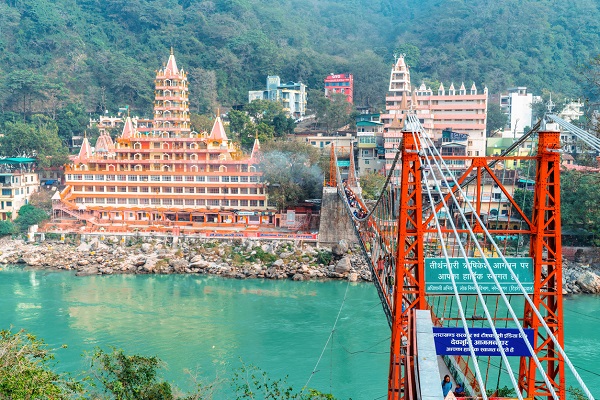.png)
Tariffs Can Bite Steel, Not Serenity: India’s $21-Billion Neuro-Advantage
India holds the blueprint for cognitive resilience. Fuse ancient neuro-biotech with science, and it becomes hard power no trade war can undermine.


Kirti Tarang Pande is a psychologist, researcher, and brand strategist specialising in the intersection of mental health, societal resilience, and organisational behaviour.
August 14, 2025 at 1:18 PM IST
Tariffs tax goods, not minds. India exports validated neuro-resilience too. Our five-thousand-year heritage is encoded in yoga’s metacognition, pranayama’s prefrontal oxygenation, and dana’s team cohesion. That is a geopolitical infrastructure no customs form can capture. Yet we price this sovereign biotech like souvenir spirituality while global rivals disassemble our living ecosystem into commoditized fragments.
The Domestic Credibility Gap
Our heritage offers something more potent than momentary serenity. Properly translated into validated, science-backed protocols, it could become the world’s most sophisticated resilience technology: a shield for soldiers, civil servants, athletes, and executives. Instead, our own people lack access to the tools global elites queue in Rishikesh to acquire. Silicon Valley pirates our open-source neuro-code while we display it as cultural décor.
While foreign executives queue in Rishikesh for cognitive upgrades, our soldiers face Siachen’s extremes without amygdala-regulation protocols. IAS officers lack vipassana-based stress buffers. Athletes choke untrained in pressure modulation. This neglect sabotages export credibility. You cannot market neuro-biotech globally while underutilizing it domestically.
Psychology as a Strategic Interpreter
Yoga mats without lab coats fail. A hedge-fund manager can leave Rishikesh “blissed out” and still crack on Monday’s margin call. Serenity needs scientific scaffolding.
Positive Psychology, popularised by Martin Seligman in 1998, bridges ancient wisdom and modern validation. Where tradition offers ahimsa (non-violence), positive psychology’s randomised controlled trials transform it into conflict-resolution algorithms for trade negotiators. Vipassana’s silence becomes measurable prefrontal activation under fMRI.
Embedding biometrics and ethical foundations into training could transform our domestic robustness, and, in turn, the credibility of our exports.
This where Psychologists become an asset. Positive psychologists can design rigorous, validated protocols that quantify these traditional practices in neurobiological and psychological terms, creating the legitimacy global adoption demands. They can partner with neuroscientists to measure cortisol reduction, memory enhancement, and PTSD resilience through RCTs, neuroimaging, and biomarker tracking. They can explain, through theories like Barbara Fredrickson’s broaden-and-build model, how positive states triggered by these practices create lasting resilience and cognitive advantage.
Once validated, these modules cease to be ‘soft power’ and become cognitive infrastructure.
This translation is non-negotiable. Serenity untethered from biometric-verified resilience is tourism, not strategy.
Wellness Diplomacy 2.0
Wellness diplomacy must extend far beyond yoga festivals. Imagine exchanging Kerala’s PTSD-resilience protocols for tariff concessions in ASEAN. Or gaining EU recognition for Ayurvedic qualifications in return for IT tariff relief. Or training African healers in trauma-informed meditation as a counter to rival influence. This is hard infrastructure for global stability.
The call to action is clear:
Policymakers: Mandate neuro-resilience in civil-service, police, and armed-forces training; create validated “cognitive readiness” indices for career progression; and fund national neuro-wellness research hubs.
Investors: Treat wellness biotech like semiconductor fabs, high-ROI factories producing stress-resistant leaders.
Corporates: Move from perk-based wellness to biomarker-driven sabbaticals and empirical resilience training.
We must act while India still holds the motherlode.
Because the West has already begun fragmenting our heritage into commoditised products. Silicon Valley strips dhyana of its sangha context, selling “mindfulness apps” that fuel screen addiction. Harvard divorces pranayama from yama-niyama, rebranding it as “resilience training” for oil executives burning the planet. They disassemble a living ecosystem into dead widgets. This is not merely cultural appropriation; it is scientific malpractice.
When a Goldman Sachs managing director pays $30,000 for a Rishikesh retreat but returns to short Indian markets, it’s because we have offered him fragments, not the framework.
This integration is not optional; it is existential. Positive Psychology is not Western garnish on our thali. It is the microscope proving why our biotech works. Yoga alone gives you flexible hamstrings; yoga plus Seligman’s PERMA model gives you a soldier who has trained pain-tolerance neural pathways. Ayurveda alone balances doshas; Ayurveda plus broaden-and-build creates CEOs who turn cortisol spikes into creativity, not collapse. Shastra provides the code; science compiles it for foreign operating systems.
The alchemy demands three rebellions. Policymakers must replace yoga festivals with National Neuro-Resilience Labs, where Charaka Samhita collides with Duckworth’s grit scales under fMRI gaze. Visa policies should lure neuro-diplomats, not tourists, for cognitive firmware updates. Investors must back ventures where ashrams yield biometric ROI: "18% crisis resilience per lakh spent on shatkarma.” CEOs require bridge technician wellness directors fluent in both sutras and Hobfoll’s resource theory, turning pratyahara into KPI armor.
Strategic Ammunition
India has gifted the world its deepest operating system for human flourishing, then outsourced the user manual to Palo Alto. The same US senators advocating tariffs also fund NIH studies proving surya namaskar boosts serotonin, even as their trade reps call our exports “non-essential services.” The hypocrisy is combustible.
While Washington obsesses over steel tariffs, Delhi can trade in what no Pentagon can sanction: stress-proof nervous systems. This trade war will not be won in boardrooms, but in the synaptic gaps of those who run them. This trade war will be won not in boardrooms, but in the synaptic trenches of those who lead them. India has refined this biotech for five millennia. The only question: Will we license it, or surrender it?



